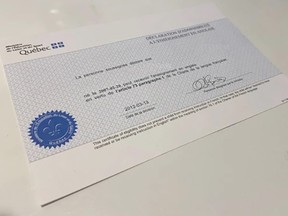If you’re an adult who didn’t already have one, you can’t get one, even if you would be eligible.

As reported in The Gazette on Wednesday, under the heading “oral and written communication,” the Health Ministry spells out the conditions for the exclusive use of English in the health sector included in the new directives submitted July 18.
“An (institution within the health network) can communicate in English exclusively with a person” provided that they meet two criteria:
- They have been “issued the document Déclaration d’admissibilité à recevoir l’enseignement en anglais du ministère de l’Éducation du Québec,” otherwise known as the English-language eligibility certificate.
- They must also “expressly request” English services.
Until the directive was issued by the Health Ministry, no non-francophone Quebecer was required to produce an eligibility certificate to seek and receive medical services in English.
French Language Minister Jean-François Roberge responded to The Gazette’s series of articles on X, formerly known as Twitter, saying the directive allows anyone who wishes to receive health-care services in a language other than French to do so.
But his assistant chief of staff told The Gazette the government has no intention of dropping the new requirement the province’s “historic anglophones” produce an eligibility certificate from the Education Ministry to be allowed to communicate exclusively in English in the health sector.
Roberge also said on X “with the exception of members of the historic English-speaking community, the directive provides communications of an administrative nature or which do not compromise the health of the user must be in French.”
So how do you get a certificate?
However, to obtain a certificate, the child must still be in either elementary or high school, a representative from the Ministry of Education told The Gazette.
“It is not possible to obtain a certificate once elementary and high school studies are completed,” said the representative of the department overseeing English language certificate eligibility.
What if you went to school in Quebec in English, but are not certain if you have a certificate, or have lost track of it?
If you do have one, the ministry can send you a copy if you send them a copy of your birth certificate. You can also obtain it by going through the school board that was responsible for your school.
If you did not go to school in English in Quebec and never applied to receive a certificate, chances are you don’t have one.
What if you didn’t go to an English school in Quebec, even if you were eligible, and don’t have a certificate?
Reader Derek Heatherington told The Gazette he looked into getting his certificate this week after reading about the new directives, and was told he had a certificate because he did his schooling in English, and a copy could be sent to him. (Although he was told at first he could not have a copy because he was an adult.)
But his wife, who would have qualified for an English-language certificate because both her father and grandfather went to school in English, never applied for one because she did her schooling in French.
Now that she would like to get one in order to ensure she can receive information in English for health-care services, she has been told she cannot, because as an adult out of high school, she can no longer apply.
Heatherington’s wife is not alone.
According to the 2021 census, there were 304,000 children age five to 17 in Quebec who were eligible for instruction in English. Almost one-quarter of those — 23.8 per cent, or more than 72,000 — had never attended an English-language school. The census didn’t ask how many of those students had obtained an English eligibility certificate.
Meanwhile, Heatherington is going through the process of obtaining a copy of his certificate, but says while he waits, “I have to worry about if I have a heart attack and I’m in hospital, I can’t be treated in English because I don’t have my English-eligibility certificate with me.”
Does this mean thousands of Quebecers who would prefer to have their health information transmitted in English will not be allowed to because they are unable to get their eligibility certificates, even if they were legally allowed to have them?
It’s unclear. The Gazette sent this question to Roberge’s office on Friday. His press attaché sent an automated email saying he was on vacation and advising journalists to contact another press attaché. That press aide also responded with an automatic response, advising journalists to contact the first press aide The Gazette contacted.